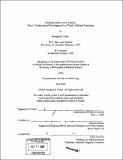| dc.contributor.advisor | Suzanne Berger. | en_US |
| dc.contributor.author | Fuller, Douglas Brian | en_US |
| dc.contributor.other | Massachusetts Institute of Technology. Dept. of Political Science. | en_US |
| dc.coverage.spatial | a-cc--- | en_US |
| dc.date.accessioned | 2006-07-31T15:23:03Z | |
| dc.date.available | 2006-07-31T15:23:03Z | |
| dc.date.copyright | 2005 | en_US |
| dc.date.issued | 2005 | en_US |
| dc.identifier.uri | http://hdl.handle.net/1721.1/33681 | |
| dc.description | Thesis (Ph. D.)--Massachusetts Institute of Technology, Dept. of Political Science, 2005. | en_US |
| dc.description | Includes bibliographical references (p. 373-390). | en_US |
| dc.description.abstract | With the advent of economic globalization, the terms of debate over the political and social conditions necessary to foster development in the Global South have shifted. Examining technological development, one important aspect of economic development, in China, I explore the prospects for and conditions conducive to development under globalization. My main finding is that the developing world has significant opportunities for development through combining the institutions of global capital, defined here as the financial institutions of the advanced economies, with co-ethnic technologists returning from abroad. Global capital serves to ameliorate the inefficiencies of China's financial sector. The co-ethnic technologists establish hybrid firms that possess foreign finance and a strategic commitment to develop core technological activities in China, a strategic orientation commonly associated with domestic firms and not foreign ones. I call this developmental path the global hybrid model. Using two case studies from China's IT industry, I demonstrate that the hybrid firms outperform both other foreign-invested enterprises and domestic firms in technological upgrading. | en_US |
| dc.description.abstract | (cont.) The domestic firms underperform the foreign-invested firms because the Chinese financial system severely misallocates credit. Credit misallocation undermines incentives for technological development among domestic firms. The hybrids and the other foreign-invested firms rely on the institutions of global capital to allocate capital more efficiently, but the hybrids contribute more to local technological development due to their strategic commitment to China. The shared ethnic identity between the hybrids' owners and the local economy provide these firms with the ideas and interests that motivate them to pursue this strategic commitment to China. The global hybrid path provides several insights on the problem of development under globalization. By importing foreign financial institutions, the global hybrid model lowers the institutional bar for development because developing countries need not have highly capable states or well-functioning markets to develop. Yet, global capital alone is not sufficient to achieve development because global capital has no serious commitment to host country development. | en_US |
| dc.description.abstract | (cont.) In place of the previously proposed solution of state discipline of foreign firms to create commitment, co-ethnic technologists provide the motivation for hybrid firms to contribute significantly to developing host economies. | en_US |
| dc.description.statementofresponsibility | by Douglas B. Fuller. | en_US |
| dc.format.extent | 390 p. | en_US |
| dc.format.extent | 22836733 bytes | |
| dc.format.extent | 22853971 bytes | |
| dc.format.mimetype | application/pdf | |
| dc.format.mimetype | application/pdf | |
| dc.language.iso | eng | en_US |
| dc.publisher | Massachusetts Institute of Technology | en_US |
| dc.rights | M.I.T. theses are protected by copyright. They may be viewed from this source for any purpose, but reproduction or distribution in any format is prohibited without written permission. See provided URL for inquiries about permission. | en_US |
| dc.rights.uri | http://dspace.mit.edu/handle/1721.1/7582 | |
| dc.subject | Political Science. | en_US |
| dc.title | Creating ladders out of chains : China's technological development in a world of global production | en_US |
| dc.type | Thesis | en_US |
| dc.description.degree | Ph.D. | en_US |
| dc.contributor.department | Massachusetts Institute of Technology. Department of Political Science | |
| dc.identifier.oclc | 64584552 | en_US |
